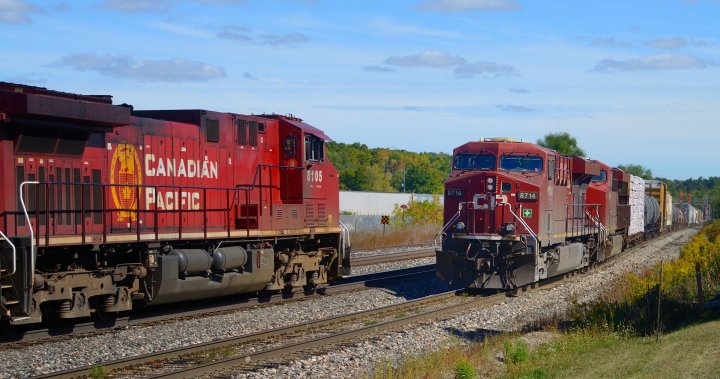As early as next week, Canada could see workers at its two major railways either going on strike or locked out by the railways and Canada’s food industry is nervous.
On Friday, Canadian National Railway Co. and Canadian Pacific Kansas City Ltd. warned they will lock out employees on Aug. 22 unless they can reach deals with their employees, lending new weight to the threat of a work stoppage that could snarl supply chains countrywide.
That is the date set by the Canada Industrial Relations Board for the soonest any lockout or strike could happen.
The Teamsters Canada Rail Conference (TCRC), which represents some 9,300 engineers, conductors, yard workers and rail traffic controllers, claimed that CPKC wants to “gut the collective agreement of all safety-critical fatigue provisions.”
“The Teamsters will provide 72 hours advance notice in the event of any strike action,” the union said on Aug. 8. “The union’s focus remains on negotiating in good faith and reaching agreements at the bargaining table. Whether or not that is possible is entirely up to CN and CPKC.”
Barry Prentice, director of the transport institute at the University of Manitoba’s Asper School of Business, said farmers in the Prairies would feel the pinch.
“We (Canada) produce much more food than we consume. Probably double. So we depend on exports. We export meats as well as lots of grains and other products. But the grain industry is the one that’s perhaps the most critical right now because the harvest has already started,” Prentice said.
Jill Verwey, president of Keystone Agricultural Producers (KAP), told 680 CJOB’s The Jim Toth Show that the timing of the potential strike is not good for farmers.
“With producers going to the field currently for some of the spring crops, and as we head into the harvest season, it puts a real strain on our handling facilities and being able to make sure that we get our crop to port in time to meet those deadlines,” Verwey said.
“The timing couldn’t be any worse on a system that has gone through some real challenges as far as trying to meet some supply demands.”
In Saskatchewan, the provincial government has expressed concern.
“This will have a great impact not only on farmers and ranchers here in the province of Saskatchewan but the whole entire economy,” Saskatchewan Agriculture Minister David Merit said.
“We’re very concerned about our trade relationships with other countries and that has a very detrimental impact.”

Prentice said while most farms have grain storage, it is limited.
Breaking news from Canada and around the world
sent to your email, as it happens.

Get breaking National news
For news impacting Canada and around the world, sign up for breaking news alerts delivered directly to you when they happen.
“They do depend on a certain amount of grain coming off the combine going straight to the elevators and off to the ports for shipment, because that’s where they get paid,” he said.
He said any work stoppages would put Canadian farmers out west in a difficult position as most of them have few options outside of the railways to move their product.
Fertilizer Canada said the threat of work stoppages has already started to impact the movement of fertilizers and added that they are expecting further embargoes and slowdowns in rail services.
“A work stoppage that prevents the transportation of fertilizer will have potentially disastrous effects on crop yields and food security,” Fertilizer Canada said in a statement.
According to the group, 75 per cent of Canada’s fertilizer supply is moved via rail.
“We have had the threat of a work stoppage hanging over our heads since the beginning of the year. Farmers around the world rely on Canada’s fertilizer industry to maximize crop yields, and the fertilizer industry relies on rail to get our products to market.”
The group said this would hurt Canada’s reputation as a supplier of fertilizer and give an edge to its competitors, like Russia and China.

Prentice said the broader economy is already starting to feel the strain.
“U.S. railways are starting to embargo shipments to the Canadian railways now, so they will not allow any shipments to go forward,” he said.
“Canada already has a pretty bad reputation in foreign markets for grain because we’ve had strikes at the ports, rail strikes as well outages because of environmental impacts.”
While the biggest impact if the strike goes ahead is expected to be on farmers in Saskatchewan and Manitoba, Prentice says Eastern Canada would also feel an impact. He said this could include the auto industry in Ontario or the container industry in Quebec.
Canadian railways haul more than $350 billion worth of goods and more than half of the country’s total exports each year, according to the Railway Association of Canada.
Prentice said even if a strike occurs, it is unlikely to be a long-term stoppage.
“History has shown that the government will not permit these strikes to go on for long. They simply can’t, they’re just too damaging to the economy and to too many individuals.”
Union demands are largely centred around quality-of-life improvements and rail safety.
“From the very beginning, railworkers have only ever sought a fair and equitable agreement. Unfortunately, both rail companies are demanding concessions that could tear families apart or jeopardize rail safety,” Teamsters president Paul Boucher said in a statement Friday.
The railways have put forward two different sets of offers each, stating that they all comply with safety rules — a point the union has not denied.
One CN proposal would see employees on a scheduled 40-hour workweek, with at least 10 or 12 hours of rest between shifts — depending on whether they’re at home or away — and either two or three consecutive days off each week, in compliance with the law.

The scheduled approach to shifts — a comparable offer was tabled by CPKC before being withdrawn “conditionally” on Friday — would mark a drastic change from the mileage-based system of pay that has been in place for decades at both companies.
If accepted, the new arrangement would make for more predictability for workers and managers, the railways say. But if an employee reached their destination hours ahead of time, it would also mean they could be assigned to other tasks rather than clocking out on arrival.
“None of CN’s offers compromised safety in any way. The latest offer proposed third-party arbitration,” the Montreal-based railway said in a release Friday.
— with files from The Canadian Press and Global’s Sam Thompson and Andrew Benson





